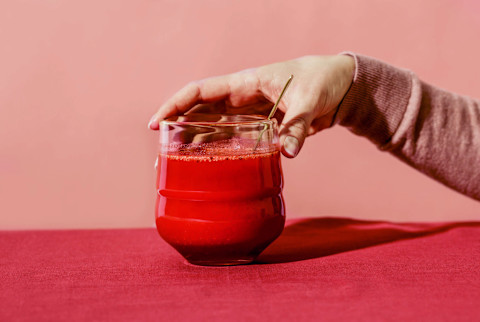
Want to try out a vegan diet? You are in good company. Lots of people are putting v-power to work for better athletic performance, weight loss, or to tackle a health problem, like high cholesterol, diabetes, high blood pressure, menstrual pain, or arthritis. But if you are wondering how to start, let's make it easy. I go over this more in my book, The Vegan Starter Kit, but this is a good breakdown of the five steps to successfully starting a vegan diet.
Step 1: Check out the possibilities.
This step takes seven days. For the next week, check out the possibilities. For now, don't take anything out of your diet. Rather, just think about meals that you would actually like to eat that have no meat, cheese, or other animal products. Our goal is to develop a list of foods that work for you.
Take a sheet of paper and jot down headings for breakfast, lunch, dinner, and snacks. Under each heading, pencil in some ideas. If you normally have a breakfast of cereal and milk, this is your opportunity to try out almond milk. Or maybe soymilk, rice milk, hemp milk, or any of the zillion other nondairy milks that are on grocery shelves these days. See which ones you like best.
If you have not made oatmeal since you were a kid, pick some up, along with your favorite toppings: slivered almonds, blueberries, strawberries—you name it. Want to try veggie sausage? You'll find it at any health food store. If scrambled eggs are your thing, try scrambled tofu. Tofu has a consistency almost identical to egg white, and you can scramble it with nutritional yeast and soy sauce for flavor.
Experiment with new products and, if you like, new recipes. Foods that are not winners come off your list, but foods you really do like stay on it. Do the same for lunch, dinner, and snacks.
And how about restaurant meals? You will find good choices at Italian restaurants: minestrone or lentil soup, a spinach salad with candied walnuts, capellini with tomatoes and fresh basil, or penne arrabbiata, grilled asparagus, and an espresso. Or if Mexican is your thing, how about veggie fajitas or a bean burrito (hold the cheese)? Chinese restaurants have dozens of vegan choices—rice dishes, vegetable dishes, and tofu dishes. If you prefer Japanese food, you'll find miso soup, salads, and sushi using cucumber, asparagus, gourd, or tofu instead of fish.
If you frequent fast food places, some offer veggie burgers. At a submarine sandwich shop, skip the meat and cheese and pile on the lettuce, tomato, cucumbers, hot peppers, spinach, olives, and red wine vinegar. They will even toast it for you. Taco places will make you a bean burrito. A pizzeria will be glad to leave off the cheese and pile on extra sauce and all the veggies.
By day seven, you will have plenty of ideas for meals that are free of meat, cheese, etc., and that you genuinely like.
Step 2: Jump in.
Now is the time to jump in. For the next three weeks, make it all vegan all the time and avoid animal products completely. It's easy because it's only three weeks—and you have already picked out foods you like. Stock up, and let's go!
During this three-week phase, let me encourage you to be strict. Our goal is to really see what a vegan diet can do. Feel free to use "transition foods"—that is, substitutes for meat, cheese, etc. You will find great veggie burgers, veggie hot dogs, nondairy yogurt, and many, many more, and they can ease the transition.
Stay open to exploring new products, new restaurants, new recipes, and new websites. You'll find more and more treasures. And if you have the occasional dud, don't worry; that's what exploring is all about.
Step 3: Size up your progress.
After 21 days, size up your progress. Chances are, you will discover two things: First, you are healthier. You'll have lost a few pounds. If you have diabetes, your blood sugars will have improved. Your digestion will be better, and your mood may be better, too. If you check, your cholesterol and blood pressure will likely have improved as well.
Second, your tastes are starting to change. You did not expect this, but it happens. You are less drawn to the greasy animal products that got you into trouble, and you are finding new tastes to explore.
Step 4: Find a friend.
Now is a good time to think about others who might benefit from a vegan diet. A spouse or partner, a parent or your kids, a friend at work—you can invite them to try out a diet change, too. It does not have to be a long-term commitment. But if you invite them to join you for another three-week "experiment," you'll find that they will benefit, and you will, too.
Now is also a good time to think about who else benefits from your new and healthy choices: The environment benefits dramatically when people take the animal products off their plate. And it goes without saying that animals benefit. Americans eat—believe it or not—more than 1 million animals every hour. You have just taken a big step toward helping those with whom we share this planet. An appreciation for the full range of benefits will help you maintain your resolve during any moments of doubt.
Step 5: Don't think too far ahead.
Keep a short-term focus. By now, you may feel that you never want to return to your previous way of eating. But do not feel that you need to make any kind of long-term decision. Just keep your focus on what you are eating now. Keep it vegan, and the future will take care of itself.
So there you are. You've done it, and the benefits will keep on coming, both for you and all those you inspire with your good example.
